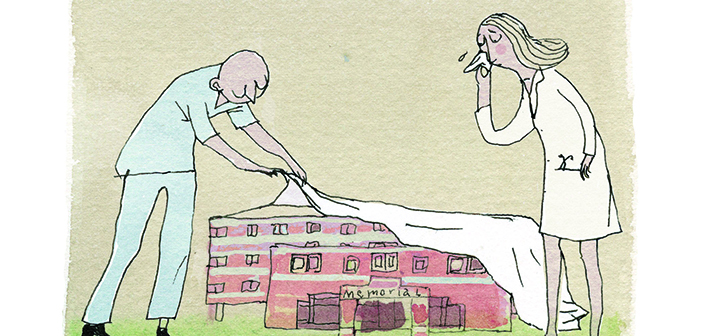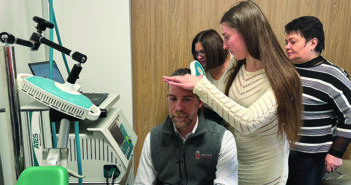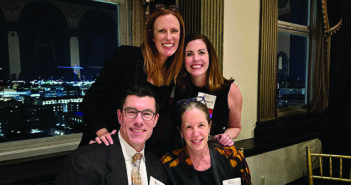A resident reflects on the closing of Memorial.
At the turn of the 20th century, funded by a generous bequest from William F. Sayles, a community-based infirmary known as The Pawtucket General Hospital opened a 30-bed facility to serve the workers of the Blackstone Valley. As an “instrument of public good,” the hospital promised to treat anyone, regardless of ability to pay.
Throughout the next few decades, the renamed Memorial Hospital underwent phenomenal growth to include pediatric, maternity, emergency, surgical, and intensive care services, functioning as a comprehensive general hospital. In 1975, as hospitals across the state established a relationship with Brown University’s new medical school, Memorial became the home of the emerging and all encompassing field of family medicine.
The same year, the Division of Family Medicine established a residency program affiliated with Brown, which I am privileged to be a part of. Within the walls of the hospital and the adjoining primary care clinic, my predecessors trained in collaboration with internists and specialists to provide care across the life cycle to some of the most underserved and diverse communities in the state, including many who immigrated from Latin America, Cape Verde, and West Africa.
Despite the hospital’s growth, Memorial found a way to maintain its “small-town feel.” As trainees, it wasn’t unusual for the hospital’s telephone operator to recognize us by voice and vice versa. Across the departments, faculty came to know most trainees personally, significantly decreasing our stress level when calling a consult in the middle of the night. The stairwell between the Hodgson and Wood buildings was a common meeting place, as physicians, nurses, and staff traveled between the basement cafeteria and their respective departments.
On any given day as a family medicine resident, you could see patients in your clinic in the morning, stroll across the parking lot to “Wood 2” (the maternity care unit) at lunchtime to check on your prenatal patient’s labor progress, and then suture head lacerations on your ER rotation in the afternoon. If the stars aligned, you might run up to deliver your patient’s baby and perform a newborn exam before your drive home—all in a day’s work. This quaint, self-contained model of practice resonated with many graduates, who now comprise almost two-thirds of family medicine physicians in Rhode Island.
The closure of Memorial Hospital has a far-reaching impact on its providers and the community it serves. For many Blackstone Valley residents, this is the only hospital they have ever used, for births, deaths, and everything in between. Some employees have worked there for decades and served multiple generations of families.
As family medicine physicians, we mourn the dissolution of a full-spectrum model of care that Memorial Hospital embraced. However, the tumultuous period of change has borne opportunities to expand our presence within inpatient settings across the state, allowing for more exposure to our field and for increased interdisciplinary collaboration. And even as our patients migrate to other hospitals, we continue to care for them under our newly established inpatient services while remaining committed to providing exceptional primary care based in the Blackstone Valley.
We may no longer meet in the stairwells, but we will always carry with us the camaraderie and spirit that resonated throughout our beloved community hospital.




